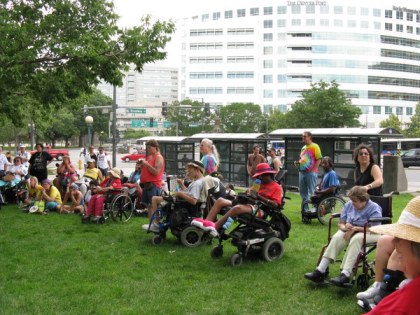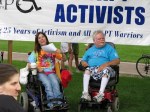ATTN: All Team Members
FROM: Timothy Q. Snorfleblark, Director of Human Resources
RE: Politically Correct Methods of Addressing the Able-Bodied
Team,
It has come to our attention that certain persons in this office have shown a marked lack of sensitivity in addressing able-bodied team members. Several complaints have been filed with Human Resources, forcing us to take action. The offending individuals have been warned, but insensitivity toward the able-bodied seems to be a company-wide problem. As a result, Human Resources has put together a simple guide to appropriate methods of addressing the able-bodied. Please read in full, and, when in doubt, consult Human Resources before doing or saying anything you feel could potentially be offensive.
Sincerely,
Timothy Q. Snorfleblark
Director, Human Resources
ACME Mega-Corp
ATTACHMENT: “ablebodiedsensitivity.doc”
Use of Appropriate Language
Using appropriate language in the workplace is essential to maintaining a harmonious work environment. All coworkers deserve to feel safe and accepted at work, regardless of their disability or lack thereof.
In order to avoid causing discomfort to able-bodied team members, please refrain from using terms like “social model of disability,” or “crip culture” at work. It is considered rude by the able-bodied community to create confusion and challenge preconceptions by asserting that people with disabilities do not want to be cured of their conditions.
In the same vein, calling coworkers “curebies” is also inappropriate, particularly as a reaction to the expression of a charitable sentiment or a request for donations to a worthy cause.
“Crip fashion” is also a term politically incorrect for usage in the presence of the able bodied. The able-bodied consider this term inaccurate and offensive. It is very impolite to insinuate in front of able-bodied team members that team members with disabilities are concerned with beauty, dating, and sex. As discussed above, this causes confusion and discomfort. Please be considerate of others.
When referring to your disability in the presence of able-bodied team members, do not call yourself a “crip,” “gimp,” “amp,” or any other term that could be associated with language reclamation. Many able-bodied persons suffer from a fear of change. In order to make your coworkers’ selection of appropriate verbage easy, refer to yourself as a “person with a disability,” if you must refer to your disability at all.
Making Conversation with the Able-Bodied
When conversing with able-bodied coworkers, remember that their condition may prevent them from understanding certain types of humor or relating to certain topics of conversation. Please do not discuss bodily fluids, catheters, colostomy bags, or assisted showering and toileting. It is considered polite within the able-bodied community to limit discussion of disability to positive and uplifting topics.
In order to converse politely with the able-bodied, try mentioning an exciting hobby like tennis or swimming. Make sure to emphasize how you’ve overcome your disability in order to compete or participate in this hobby. The able-bodied person may tell you that you are “an inspiration.” This is a compliment; please accept it graciously. Some people who are able-bodied may even be moved to tears by your courage. Again, this is to be considered a compliment.
Some able-bodied team members may make conversation by pointing out to you news stories about disabled persons, or by asking if you know another person with the same disability. This reflects the depth of their caring and an effort to reach out to you. Laughter is not an appopriate response to such a query. Nor is it polite to call an article brought to your attention by a coworker, “stunningly bad disability journalism, typical of the New York Times.”
If in doubt, limit topics of conversations to sports, crafts, and the weather. Discussing sex, health, politics, dating, friendship, work, or, worst of all, protests and activism, with able-bodied coworkers may contradict existing prejudices and offend a team member.
Meetings and Office Parties
Appropriate behavior during workplace gatherings is just as important as appropriate behavior during one-on-one interactions. Please do not scold coworkers for assisting you at office functions by preparing your food, pushing your wheelchair to an appropriate location within the room, or ordering for you at group lunches. It is important to allow the able-bodied to keep their sense of autonomy and control intact despite the presence of disabled persons within the organization. Thank able-bodied coworkers for friendly gestures such as those listed above, in order to help preserve their self-image as charitable and inclusive individuals.
Complaining about accessibility at office functions is frowned upon. Providing ASL interpreters, for example, might take away from the positive experience of others during parties. You wouldn’t want to be seen as selfish, would you? The same goes for requesting that team-building exercises be conducted at fully wheelchair-accessible facilities. The able-bodied community loves paintball and ropes courses, and it would detract from their enjoyment of these delightful activities if a disabled person were to come along and repeatedly emphasize his or her inability to participate.
In order to avoid offending a team member, it is best to excuse yourself from events where access could prove challenging. Use an excuse that doesn’t reference your disability if at all possible. A sick family member, flat tire, or salon appointment is a good excuse not to attend team building exercises. If you recuse yourself in plenty of time, you’ll avoid looking like a wet blanket while others are having fun.
During meetings, please avoid calling attention to your disability by objecting to the language or suggestions of others. The able-bodied are very sensitive, and scolding them in front of their peers could cause emotional trauma.
If all of these guidelines are followed, we anticipate that our workplace can be a fun and inclusive environment for all. Let’s remember our company motto: “What’s Good for the Company is Good for All!”
Disclaimer: This post is satirical and inspired by this and this. Please have a good laugh at the expense of ignorant ABs everywhere.






